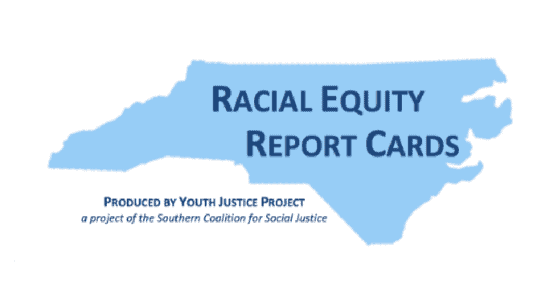Durham, N.C. — While Black students make up 25% of children in North Carolina public schools, they receive 55.2% of all short-term suspensions. White students, who comprise 47.3% of all students, only receive 25.8% of all suspensions. These and other findings of disparity are detailed in the statewide Racial Equity Report Card issued today by the Southern Coalition for Social Justice.
In all, Black students are 4.1 times more likely than White students to receive a short-term school suspension. Research shows that suspensions increase both a student’s chances of struggling in school and future involvement in the criminal justice system.
Issued annually since 2016, the Racial Equity Report Cards (RERCs) use public data to provide a snapshot of the school-to-prison pipeline in each of the state’s 115 school districts as well as the state as a whole. The school-to-prison pipeline is the system of policies and practices that push students out of school and into the juvenile and adult criminal justice systems. This year’s report cards primarily use data from the 2018-2019 academic year.
The pipeline has three key entry points: academic failure, school discipline and court involvement. Students of color are overrepresented at each entry point to the pipeline in almost every school district in North Carolina, and once students enter the pipeline it can be difficult for them to re-engage and be successful at school.
“Many factors contribute to the racial disparities we see in schools across the state, including the implicit racial bias of decision makers, structural racism and, in some cases, explicit discrimination against students of color,” said Meredith Horton, deputy executive director of the Southern Coalition for Social Justice. “The RERCs provide critical information and a call-to-action for students, parents, educators, advocates and policy makers to work together to examine the causes of racial inequity in their schools and to develop solutions that will help dismantle the school-to-prison pipeline.”
The RERCs reveal that while 52.7% of students in North Carolina schools are of color, only 21.3% of teachers and administrators are. Having a diverse school staff is one way to help equalize opportunities for students of color.
Other key findings include:
- White students were 2.1 times more likely to score as “college to career ready” on end-of-grade tests between third and eighth grades than Black students and 1.7 times more likely than Hispanic students.
- The academic gap grows slightly in high school with White students 2.3 times more likely to score “college to career ready” on high school end-of-course tests than Black students and 1.8 times more likely than Hispanic students.
- Hispanic and Native American students are the least likely to graduate from high school in four years, with statewide graduation rates of 81.1% and 81.2% respectively. In comparison, 89.6% of White students graduate in 4 years.
- Statewide, 45.1% of all juvenile referrals to the criminal justice system came from schools; Black students were the most likely to be referred to the justice system, with 47.6% of all incidents being referred to the criminal justice system compared to 36.5% among White students.
“There are a number of things that school boards and the larger communities they serve can do to help end the school-to-prison pipeline and increase opportunities for all students,” Horton said. “Investing in smaller class sizes, as well as professionals such as social workers and counselors, eliminating policies that criminalize schoolyard behavior and getting community and parent input on discipline procedures can all make a significant and lasting change.”
Additional information about the school-to-prison pipeline and Racial Equity Report Cards for each school district can be found at southerncoalition.org/resources/racial-equity-report-cards.
###
The Southern Coalition for Social Justice, founded in 2007, partners with communities of color and economically disadvantaged communities in the South to defend and advance their political, social, and economic rights through the combination of legal advocacy, research, organizing and communications. Learn more at southerncoalition.org and follow our work on Twitter and Facebook.

